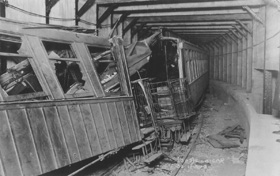On this day, November 1, 1918, the worst rapid transit accident in US history occurred.
Last edited Fri Nov 1, 2024, 04:27 PM - Edit history (1)
https://en.wikipedia.org/wiki/November_1
• 1918 –
Malbone Street Wreck: The worst rapid transit accident in US history occurs under the intersection of Malbone Street and Flatbush Avenue, Brooklyn, New York City, with at least 102 deaths.
Malbone Street wreck
Coordinates: 40°39'46"N 73°57'45"W

Remains of the wreck
Details
Date: November 1, 1918; 106 years ago; 6:42 p.m.
Location: Flatbush, Brooklyn, New York
Line: BMT Brighton Line
Operator: Brooklyn Rapid Transit Company
Passengers: ~650
Deaths: 93–102
Injured: ~250

Wrecked car with wood splinters and glass shards
The
Malbone Street wreck, also known as the
Brighton Beach Line accident, was a rapid transit railroad accident that occurred on November 1, 1918, on the New York City Subway's BMT Brighton Line (now part of the BMT Franklin Avenue Line) in the Flatbush neighborhood of Brooklyn in New York City. A speeding train derailed in the sharply curved tunnel beneath Willink Plaza, the intersection of Flatbush Avenue, Ocean Avenue, and Malbone Street (now known as Empire Boulevard). At least 93 people died, making it the second-deadliest train crash in American history, as well as the deadliest crash in the history of the New York City Subway.
The circumstances leading to the crash included a labor strike against the Brooklyn Rapid Transit Company (BRT). The BRT had tried to keep service running with non-striking personnel, and decided to use Antonio Edward Luciano, a crew dispatcher with no experience operating the line. Other factors in the crash included the serpentine layout of the track and the weight of the individual train cars.
In the aftermath of the crash, Luciano and BRT officials were placed on trial for manslaughter. Ultimately, all the defendants were acquitted or their indictments were dropped. The BRT gradually phased out wooden cars and additional train protection devices were installed. The two most heavily damaged train cars were scrapped. In 1923, the BRT became the Brooklyn–Manhattan Transit Corporation, having gone bankrupt due to the accident. The tunnel in which the wreck occurred remained in daily passenger operation for forty years. A memorial to the crash was installed in 2019.
{snip}

